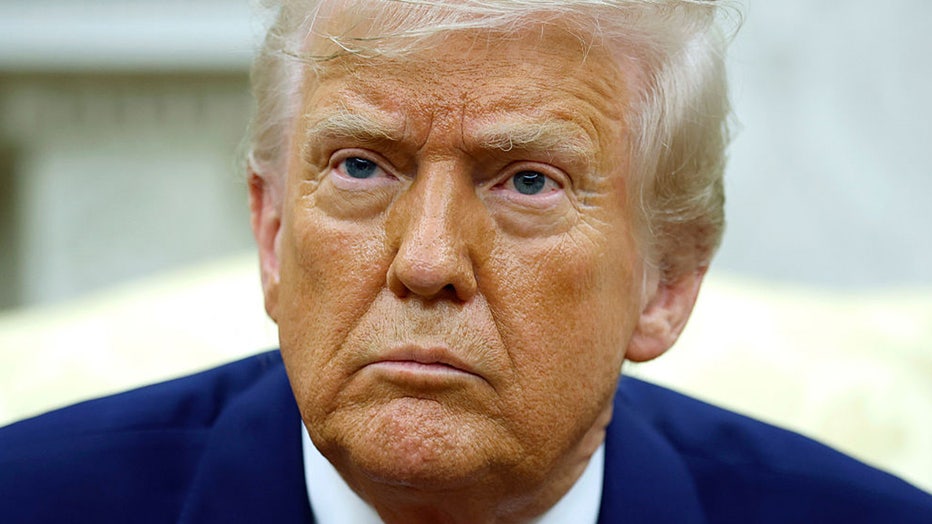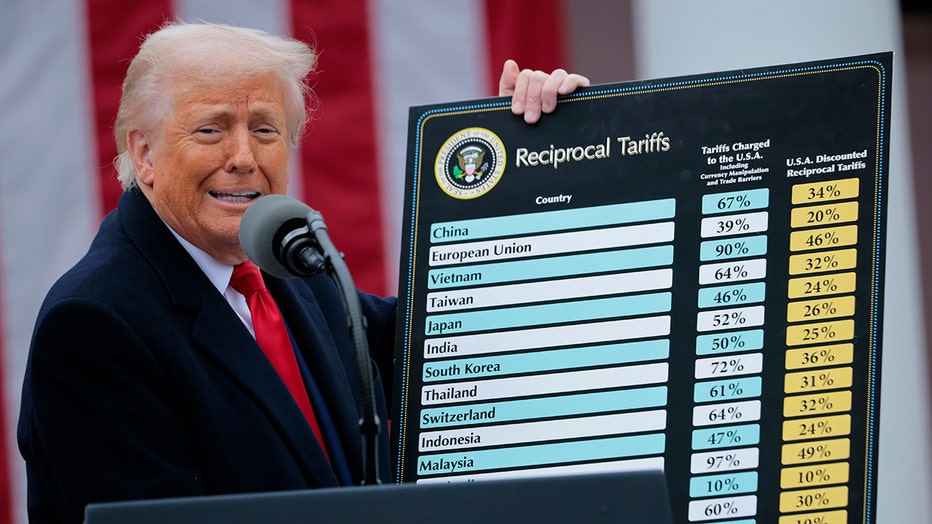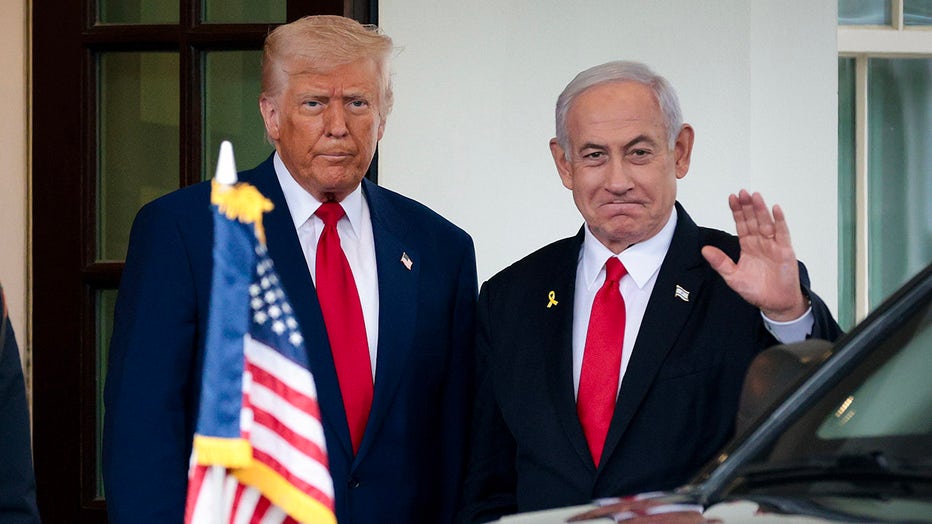China vows 'countermeasures' following Trump's threat of additional 50% tariff
President Trump, Netanyahu speak from White House
President Donald Trump and Israeli Prime Minister Benjamin Netanyahu spoke to members of the media from the Oval Office of the White House after initially canceling their joint press conference.
NEW YORK - Stocks ended lower amid another tumultuous day as markets reeled following President Donald Trump’s threats to further escalate his tariff hikes.
The S&P 500 sank 0.2% and the Dow Jones Industrial Average fell 349 points, or 0.9%. The Nasdaq composite rose 0.1%. The Dow was earlier down as many as 1,700 points following even worse losses worldwide on worries that Trump’s tariffs could torpedo the global economy.
The higher rates are set to be collected beginning Wednesday, beginning a new era of economic uncertainty.
China threatens "countermeasures" in response to Trump's tariff threats

U.S. President Donald Trump answers a reporters question during a meeting with Israeli Prime Minister Benjamin in the Oval Office of the White House on April 7, 2025 in Washington, DC. (Photo by Kevin Dietsch/Getty Images)
9:13 p.m. ET: China threatened to "resolutely take countermeasures to safeguard its own rights and interests," in response to Trump’s threat of an additional 50% tariff on Chinese imports.
The Commerce Ministry statement issued early Tuesday said the U.S.'s imposition of "so-called ‘reciprocal tariffs’" on China is "completely groundless and is a typical unilateral bullying practice."
China has taken retaliatory tariffs and the ministry hinted more may be coming.
"The countermeasures China has taken are aimed at safeguarding its sovereignty, security and development interests, and maintaining the normal international trade order. They are completely legitimate," the ministry said. "The U.S. threat to escalate tariffs on China is a mistake on top of a mistake and once again exposes the blackmailing nature of the US. China will never accept this. If the US insists on its own way, China will fight to the end."
Trump talks billions in investments for American manufacturing
4:04 p.m. ET: "We have now, $7 trillion of commitments from companies wanting to go in from Apple to many, many companies, many from Taiwan," Trump said.
When asked about what Americans are supposed to do in the meantime while these investments actually take shape in the U.S., Trump said there must be plans for reliable power for factories.
"Essentially, they're going to be in charge of the power plant because our power is not reliable enough. You have a grid that's old and susceptible to a lot of things, including bombing and weather and a lot of other things. And we're going to give them record timing in terms of approvals of electric plants. Most of them want to build electric pressure. We need massive amounts of electricity. We're going to compete with China and others," Trump said.

U.S. President Donald Trump holds up a chart of "reciprocal tariffs" while speaking during a "Make America Wealthy Again" trade announcement event in the Rose Garden at the White House on April 2, 2025 in Washington, DC. (Photo by Chip Somodevilla/Ge
Trump, Netanyahu hold joint news conference after initially canceling
3:15 p.m. ET: After their meeting, Trump said that himself and Netanyahu had a "great discussion" about Iran, the war in Israel and trade.
Trump said he plans to hold talks with Iran as soon as Saturday and insisted that Tehran can't get nuclear weapons.
Netanyahu thanked the president for inviting him back to the White House before delving into tariffs.
"I think we will eliminate the trade deficit with the United States. We intend to do it very quickly. We think it's the right thing to do. And, we're going to also eliminate trade barriers that have been up unnecessarily," Netanyahu told reporters.
Netanyahu also discussed the release of more hostages amid the war between Israel and Hamas. The prime minister also called Trump's plans to move displaced Palestinians from Gaza while it's redeveloped a "bold vision."
Trump, Netanyahu cancel joint news conference
1:35 p.m. ET: The White House says Trump and Netanyahu are expected to make comments to reporters at the start of their scheduled Oval Office meeting, the Associated Press reports, so they opted to cancel the separate press conference. This updates an earlier post with the White House explanation on the schedule change.

President Donald Trump greets Israeli Prime Minister Benjamin Netanyahu as he arrives at the White House on April 07, 2025 in Washington, DC. (Photo by Alex Wong/Getty Images)
Markets steady after early scare
1:05 p.m. ET: The Dow Jones Industrial Average was down 860 points, or 2.2%, as of 1:05 p.m. Eastern time, and the Nasdaq composite was 1.4% lower.
Earlier in a heart-racing morning, the Dow plunged as many as 1,700 points shortly after trading began, following even worse losses worldwide on worries that Trump's tariffs could torpedo the global economy. But it suddenly surged to a leap of nearly 900 points. The S&P 500 went from a loss of 4.7% to a gain of 3.4%, which would have been its biggest jump in years.
Trump threatens more China tariffs, escalating trade war fears
11:20 a.m. ET: Trump has threatened to impose more tariffs on China if Beijing doesn't withdraw its retaliatory measures, heightening concerns about a deepening trade war.
"Therefore, if China does not withdraw its 34% increase above their already long term trading abuses by tomorrow, April 8th, 2025, the United States will impose ADDITIONAL Tariffs on China of 50%, effective April 9th," he posted on social media.
Wall Street sinks again
9:45 a.m. ET: Wall Street is sinking again, following other global markets lower. The S&P 500 was down 3.8% in early trading Monday, coming off its worst week since COVID began crashing the global economy in March 2020. The Dow Jones Industrial Average was down 1,200 points, and the Nasdaq composite was 4% lower. Stocks in Hong Kong plunged 13.2% for their worst day since 1997. A barrel of benchmark U.S. crude oil briefly dropped below $60 for the first time since 2021.
Trump: ‘Tough but fair parameters are being set’
9:27 a.m. ET: Trump chimed in on Monday morning on Truth Social, writing: "Countries from all over the World are talking to us. Tough but fair parameters are being set. Spoke to the Japanese Prime Minister this morning. He is sending a top team to negotiate!"
"They have treated the U.S. very poorly on Trade. They don’t take our cars, but we take MILLIONS of theirs. Likewise Agriculture, and many other things.' It all has to change, but especially with CHINA!!!" he added.
What to know as Wall Street opens
9:15 a.m. ET: Markets on Wall Street are poised to open the week with more significant losses as fears mount that Trump's U.S. tariffs will lead to a global economic slowdown.
European and Asian shares saw dramatic losses, while futures for the S&P 500 index fell 2.7% in premarket trading. The index was down 17.4% from its recent high in February as of the end of last week. A drop of 20% or more from a recent high is what market observers consider a bear market.
Oil prices sank again, briefly dipping below $60 a barrel for the first time since 2021.
Futures for the Dow Jones Industrial Average slipped 2.4%. Nasdaq futures fell 3%.
Jamie Dimon: Tariffs will fuel inflation, slow US growth
8:15 a.m. ET: JPMorgan Chase CEO Jamie Dimon addressed Trump's tariff policy in his annual shareholder letter and noted some likely "important short-term effects."
"Whatever you think of the legitimate reasons for the newly announced tariffs – and, of course, there are some – or the long-term effect, good or bad, there are likely to be important short-term effects," Dimon said, according to CNBC and others. "We are likely to see inflationary outcomes, not only on imported goods but on domestic prices, as input costs rise and demand increases on domestic products."
"Whether or not the menu of tariffs causes a recession remains in question, but it will slow down growth," Dimon added.
German economy minister calls US tariffs ‘nonsense,’ Indonesia won't retaliate
8 a.m. ET: Earlier Monday, Germany’s Economy Minister Robert Habeck said the premise of Trump’s wide-ranging tariffs is "nonsense," and argued that Europe is in a strong position.
Habeck, who is also vice chancellor in Germany’s outgoing government, said as he arrived at a meeting of European Union trade ministers in Luxembourg that he and his colleagues must act "calmly, prudently but also clearly and with determination." He noted that means "being clear that we are in a strong position — America is in a position of weakness." He argued that "we don’t have time pressure now," but the U.S. does.
The German minister said of Trump’s tariffs that "even the basis of the calculation is nonsense: The assumption that a trade budget surplus or deficit is a problem in itself is a wrong estimation."
Meanwhile, Indonesia said it won't retaliate against Trump’s 32% tariff but will pursue diplomacy and negotiations to seek mutually beneficial solutions, according to the AP.
Indonesia had an $18 billion trade surplus with the U.S. last year and will gather input from business leaders to create a strategy for addressing the tariffs and find ways to reduce the deficit, Coordinating Economic Affairs Minister Airlangga Hartarto said on Monday.
"We will increase the volume of purchases so that the $18 billion trade deficit can be reduced," Hartarto said, according to the AP.
Hong Kong stock market slumps
7:40 a.m. ET: Hong Kong's stock market slumped 13.2% on Monday, and Financial Secretary Paul Chan said the current volatility in the market does not warrant any drastic measures to be taken – vowing the city will remain a free port.
He also blasted the latest U.S. tariffs as "bullying and unreasonable," saying they have disrupted global supply chains and severely impacted the global economic recovery process, according to the Associated Press.
Dig deeper:
Hong Kong, a former British colony which returned to China in 1997, enjoys a semiautonomy that allows its policies and economic system to be different from mainland China’s.
RELATED: China backed out of TikTok deal after Trump tariffs announcement
Netanyahu to meet with Trump at White House
President Trump, Netanyahu to meet at White House
Israeli Prime Minister Benjamin Netanyahu is expected to meet President Donald Trump at the White House on Monday, with Washington’s recently imposed global tariffs set to be part of their talks. LiveNOW from FOX host Jeane Franseen spoke to national security expert, Ken Gray on the latest.
7:20 a.m. ET: Netanyahu will meet Trump in Washington on Monday, becoming the first foreign leader to visit since Trump unleashed tariffs on countries around the world. The two leaders are scheduled to hold a press conference at 2:30 p.m. ET.
Whether Netanyahu’s visit succeeds in bringing down or eliminating Israel’s 17% tariff remains to be seen, but how it plays out could set the stage for how other world leaders try to address the new tariffs.
Netanyahu’s office has put the focus of his hastily organized Washington visit on the tariffs, while stressing that the two leaders will discuss major geopolitical issues including the war in Gaza, tensions with Iran, Israel-Turkey ties and the International Criminal Court.
Eytan Gilboa, an expert on U.S.-Israel relations, told the Associated Press that he expected Trump to use the tariffs as leverage to force out concessions from Netanyahu. Trump may pressure Netanyahu to move toward ending the war in Gaza, at the very least, through some interim truce with Hamas that would pause the fighting and free more hostages.
In a preemptive move last week, Israel announced that it was removing all tariffs on goods from the U.S., mostly on imported food and agricultural products.
The Source: This story was reported using information shared by the White House, the Associated Press, and global markets. It was reported from Cincinnati, and the AP contributed.

